
Jul 21, 2020 | Staying on Top, UpstateVibe365

Michael Nail, Associate—Ogletree, Deakins, Nash, Smoak & Stewart, P.C.
Data suggests the potential for a wave of employment litigation springing from the pandemic. At this early stage, it is difficult to fully anticipate all the types of claims that may be brought by employees and how those claims will be handled by courts or administrative agencies. Through June 2020, a review of national court filings reveals numerous employment lawsuits based on COVID-19–related claims.
A survey of South Carolina court filings also reveals a variety of employment-related lawsuits based on COVID-19–related claims that fall into the broad categories of FMLA/FFCRA interference/retaliation, wage and hour violations, retaliation/wrongful discharge, discrimination, and unsafe working conditions.
Thus far, the most common claims relate to safety in the workplace and retaliation. Many of the related claims overlap and allege complaints about reports of unsafe workplaces and adverse action resulting therefrom.
Given that the foregoing summary derives from filings during a timeframe in which most states, including South Carolina, had some version of a “shelter-in-place” or “stay-at-home” order, and many employers were either not operating or only partially operating, it is likely that these types of lawsuits will increase dramatically in the coming months.
Can Employers Utilize Any Liability Shields?
Policymakers have been pushing for immunity legislation at the federal level, but implementation remains uncertain.
No such legislation has been implemented in South Carolina, but legislation has been proposed. On June 24, 2020, the “South Carolina COVID-19 Liability Safe Harbor Act” (“Safe Harbor Act”) was introduced in the House of Representatives (H. 5527).
The Safe Harbor Act would provide liability protections for a broad class of businesses and government entities (acting in their capacities as employers and otherwise) (“Covered Entity”) that reasonably adhere to “Public Health Guidance” (as defined in the Safe Harbor Act) in effect at the time of the alleged conduct giving rise to a “Coronavirus Claim.” The Safe Harbor Act defines “Coronavirus Claim” as any cause of action that is related to any actual, alleged, or feared exposure to or contraction of Coronavirus from:
- the premises of a Covered Entity;
- the operations, products, or services provided on or off premises of a Covered Entity;
- the acts or omissions of a Covered Individual or Covered Entity, to include the delay or withholding of medical care; and
- efforts to prevent or delay the spread of the Coronavirus, to include making precautionary equipment or supplies such as personal protective equipment.
The safe harbor would not apply if a claimant were to prove by clear and convincing evidence that the Covered Entity or Covered Individual caused the injury or damage (1) through knowingly reckless, willful, or intentional misconduct; or (2) by failing to make any attempt to adhere to public health guidance. Observers expect the General Assembly to revisit the proposed law in mid-September.
Other states already have implemented temporary liability protections for employers, and legislation is pending in others. While these laws vary from state to state, the common theme is to protect employers from tort liability if they comply with applicable safety guidance.
Does the Workers’ Compensation Bar Apply?
Some states have enacted special COVID-19 workers’ compensation legislation or are considering COVID-19 amendments to their workers’ compensation laws. The new laws in many states would create a presumption that employees who contracted COVID-19 did so at work. These changes essentially shift the burden of liability from businesses to the state or create a hybrid solution.
South Carolina has similar legislation pending (HB 5482) in response to the pandemic that would create a workers’ compensation presumption. Specifically, South Carolina’s law would create an easier path for first responders, health care providers and correctional officers who contract COVID-19 to obtain workers’ compensation benefits.
Should the new law become enacted in its current form, it would almost certainly ensure that a tort claim asserted by a covered employee for exposure to COVID-19 at work would be barred by the workers’ compensation exclusivity doctrine, absent an exception to the bar, such as a deliberate intent to harm.

Jul 17, 2020 | Staying on Top
Welcome David Feild, TATT Vice Chair
Guest Presentation: Jeff Brown, VP of Marketing and Sponsorships, Greenville Drive
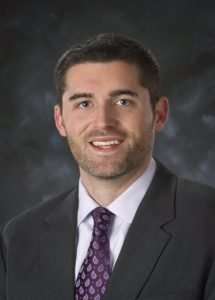
Jeff Brown, VP of Marketing and Sponsorships, Greenville Drive
In addition to appearing as our guest presenter, Jeff also wrote a guest post on the Staying on Top blog called “Down but Definitely Not Out.” You can read it here.
- This was supposed to be the Greenville Drive’s 15th anniversary year, but will celebrate next year.
- Our season was initially delayed; then, a few weeks ago, the entire season was cancelled. There is the economic challenges and then the missed opportunity to tell our anniversary stories this year.
- Unique business model – early Apr through labor day we have about 70 games; we host amateur games and events as well. Becoming more of a year-round model but we are really funded by the baseball season. So when first college sports then the Drive season cancelled and now large events are cancelled. Analogy: huge restaurant with no customers. We have no ability to ramp up, we are either ON or OFF. There is no foot traffic. No one is coming in to the stadium. Impact on our business model specifically is more harsh.
- There is not a guarantee for next year’s season given the unknowns with COVID but we are hopeful.
- We are in survival mode now. Looking toward next season. Our team has done really well facing this. We consider ourselves “the front porch” of Greenville. People can gather, talk, come together. We have done a solid job of doing that over the past few weeks. Partnered with United Way, Harvest Hope; hosted a few graduation events; PPE pickup with Blue Cross dental equipment. We are trying to be a cog for good in the community in any way we can.
- 15 years is a long time to be here; so many relationships with people/businesses, etc. So many people have asked how they can help. We are not going anywhere, we are focused on staying the course. The level of support from everyone has been humbling. For the organization, my family, …. To see the stories and feedback is motivating. Want to thank everyone for the support. Extremely challenging time but also motivating time.
- We also had to deal with contraction/elimination of minor teams across the country. The Drive are not going anywhere. There are 160 teams in minor league baseball. Not all have facilities like ours; a city like Greenville, There are issues with travel time, access, etc. but the Drive is not going anywhere. Relationship with Red Sox is the model for everyone else. There will be minor league baseball in Greenville for years to come. There may be some reshuffling of some teams in the league, but not affecting the Drive.
Question (David Field): what challenges, have you been able to qualify for PPP support from the govt? Any reductions of force?
Yes. PPP has been helpful for a staffing perspective. We have tried hard to create positions where people stay, baseball is like entertainment…lots of employees roll through quickly. We have zero revenue right now. We did furlough people and hope to bring them back when a full season returns. Due to high covid numbers we cannot even host small other events.
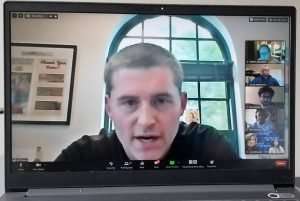 Question: You guys are missed. How are your players? Is your player roster intact?
Question: You guys are missed. How are your players? Is your player roster intact?
Yes, that is the other arm of this. We control our agreement with the Red Sox but player decisions, pay, schedule is all controlled by Red Sox. We do not control personnel of the team. We are more “entertainment” side of it, once the players come we make sure everything goes smoothly and works well. They are keeping spare 30 players in Pawtucket right now – they can replace a player who is sick with covid. So not everyone is employed right now.
Question (Dean): With MLB, they’re able to play games without fans because of TV and ad revenue from that, but minor league ball doesn’t have that angle. Was there any conversation about playing without fans in the minor leagues?
Right. Major league is starting up next week for a full season—it works because of TV. For us, we are only a live model—we need people in the seats, buying food. Majors are going to have a time matching up with city’s health requirements, etc.
Question (Dean): You have had great social media presence; what are some of the plans you have now with the team over the next couple of months to continue to be relevant? Loved the shirt you guys sold about the “undefeated 2020 season.”
The shirt was a fun idea—might as well find humor. There are about 10 of us here now; we are trying to think of things to do. We are trying to push masks—we want people healthy and we want things back to normal as soon as possible. It is just surveying how we can help the community the most and then helping. How can we be a force for good?
Question (Sharon): Today is Shoeless Joe Jackson’s birthday—is the museum separate from you guys?
Yes, there is a Board which includes his relatives, that runs it. Joe’s house (now museum) is next to the field and being moved up to the top of the street. Field St is going to be turned in to a pedestrian “Yawkey Way” with food trucks, games, etc.—like Yawkey in Boston.
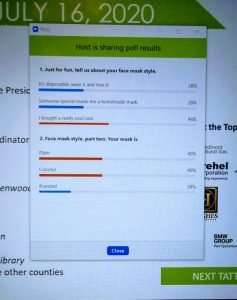 Poll: What’s Your Mask Style?
Poll: What’s Your Mask Style?
Just for fun, tell us about your mask style
- It’s disposable, wear it and toss it: 28%
- Someone special made me a homemade mask: 28%
- I bought a really cool mask: 44%
Face mask style, part 2. Your mask is:
- Plain: 40%
- Colorful: 40%
- Branded: 20%
Upstate Entrepreneur Ecosystem Update Erin Ouzts, UEE Coordinator
- Preparing support providers, talking about the conversation about small businesses having financial records
- August: local communities helping businesses being more resilient
- Best practices during the fall
- Another series: “Start to Grow”—informational videos that people can search for to provide resources
County Updates
Abbeville/Greenwood: Marisel Losa, United Way of Greenwood and Abbeville Counties
- Applied for funds to put towards food insecurity: Lakelands food and hunger alliance, also working on emergency response
- Masks, testing have been at the forefront of conversations. We did receive a large number of masks that are available to people who need them.
- Mental health and wellbeing platform: Greenwood Credible Mind
- Also looking at bringing community together to have conversations around the virus, racial reconciliation, etc. with Greenwood Counts, a data platform. More information to come about that.
Cherokee: Teresa Spires, KNOW(2)
- Keep students/parents engaged in education, broadband access is a big part of that. Fiscal agent for another nonprofit that will create hotspots and tutoring centers
- Expansion of BGen in Gaffney
- Working with the census, trying to encourage, 11th in the state (although SC is 46th in the country)
- Finished community indicators update, working on releasing to the public
Spartanburg: Todd Horne, Clayton Construction, representing the Spartanburg Area Chamber of Commerce
- Bringing Back the Burg campaign has raised $538,000
- Partnership with the hospital for the COVID pledge, 126 businesses have signed up saying they will take certain safety steps and offer masks/hand sanitizer, and they can post a plaque indicating their participation
- Lots of economic development projects going on
- Allen Smith—hospitality tax revenues higher than last year, sales taxes up, building permits up
Union: Rieta Drinkwine, Union County Library
- Census hub at the library—events to encourage participation
- Americorps Vista working on period poverty / basic needs—donation of 8 large boxes. Also partnering with United Way and Union Medical Center. Supplies are donated to the school district
- Broadband expansion—fiber, meets educational standards, can be leveraged for economic development
- Working with Detention Center, using grant money, they are going to do training/re-entry work.
- Another conversation now is how do we adjust rec programs to be able to provide safe free activities in our county. Spartanburg Library did an outdoor drive in movie, we hope to also do that. Keeping in mind that there is COVID, but that everyone needs a healthy enriched life.

Jul 15, 2020 | Staying on Top, UpstateVibe365
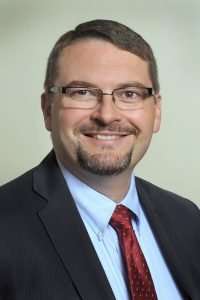
Earl Gregorich, Area Manager & Business Consultant, Greenville Area Small Business Development Centers
Anyone who has worked with small business owners and entrepreneurs has witnessed the good, bad and ugly side of how they track the financial aspects of their operations. Unfortunately, only a small percentage of business owners actually keep financial records and review them to make proactive decisions about the future of their business. The rest are somewhere between overly-reliant-on-their-bookkeeper and just-winging-it. The current COVID-19 disaster has, unfortunately, brought poor financial literacy to the forefront. So, how do we fix this? Well, it takes a concerted effort by all of us to raise the bar and set higher expectations for clients we are working with.
Take a moment and think: before you begin working with a client, do you ask them to see their financials? If you said yes, great! If you said no, ask yourself, why not? It’s pretty safe to say that no matter what consulting role you are in (marketing, HR, technology, soft skills, etc.), the advice you are about to give will have a financial impact on the business in front of you. The business owner or entrepreneur is going to make some kind of adjustment or decision based on your advice, and those will have costs associated with them and hopefully result in a positive impact on their profits.
If we aren’t asking to see the financials before doling out advice, how do we know if the client can afford our suggestion? What short/long-term impact will it have on their cash flow? Will the resulting profits be worth the investment required? Indeed, our advice may be sound, but if it does not fit the financial position of the business, at best, the advice will be ignored, and at worst, the resulting change could do damage to a business we are trying to help.
As a group, we should be working toward a standard practice of requiring entrepreneurs and business owners to provide an income statement, balance sheet, 18-month cash flow projection and a break-even analysis as we start our relationship and then periodically benchmark those numbers throughout our time with them. True, entrepreneurs may not have numbers, but they should have projections. Conversely, business owners may have numbers but may not know how to work with them. Either way, it’s our duty to emphasize the importance the numbers play in our relationship with them and how it can impact the outcomes.
Now before you point out that it’s not our job to be an accountant nor is it our job to help assemble financial statements, let us remember that there are those among us who are equipped and willing to do this work in order to help the larger entrepreneurial community better serve clients. The Small Business Development Centers help entrepreneurs with projections and business owners with financials. Bookkeepers and CPAs offer these services as well, and several lending organizations have limited services in this area also. We should be in the practice of knowing where to send a client to get the numbers straight as we work our own areas of expertise.
In closing, it’s up to us to raise the bar and set higher expectations within our entrepreneurial community. We need to work together, using the resources at hand to improve the chances of small business survival. Many of our clients were not prepared for the tough times surrounding COVID-19, and several could not qualify for disaster funds because they didn’t have an understanding of the numbers or could not produce the data needed to apply. We must do better. Together we can better prepare our entrepreneurs and business owners to become stronger and more financially literate.

Jul 15, 2020 | Staying on Top, UpstateVibe365

Jeff Brown, VP of Marketing and Sponsorships, Greenville Drive
The 15th anniversary season of Drive baseball was set to be our best ever. The events were planned. The promotions were ready. Fluor Field looked as good as ever with recent updates and fan experience enhancements. The Drive staff and the Upstate community was once again ready for a summer of family fun, high-quality entertainment, and as always, great Drive baseball. And then all of a sudden, in early March, everything changed. In the blink of an eye, instead of wearing Drive caps and Drive jerseys and sharing high-fives after a home run, we were all donning masks and staying six feet apart from each other. Nobody knew what the future held, and the best and most loyal fans in the country were left wondering if the Drive would have any kind of season.
Now we know. There will be no baseball this summer at Fluor Field; the Drive’s 15th anniversary season will have to wait until 2021. It goes without saying that the season cancellation is devastating for the Drive staff and the entire Upstate community. But in the end, the health and safety of our fans, players, and staff must always come first.
Importantly, though, even as COVID took command, the Drive continued to help and engage with the community in whatever way we could. We’ve worked with our partners and fans to give back to the community in ways that had a meaningful impact at a time when it was particularly needed. We’ve hosted events to distribute critical PPE equipment to frontline healthcare personnel; distributed food to low-income families; held high school graduations; and creatively found ways to give back to the United Way and Harvest Hope Food Bank. We’ve continued to do everything we can to show the people of the Upstate that we care, that their well-being matters to us, that we want to return the support the community has always shown us…all while we waited to find out if we were going to have any sort of baseball season.
When the decision on our season ultimately came, after a few quick deep breaths, we picked ourselves back up and took to our continuing mission of providing support to our beloved Upstate. Therefore, we remain as committed as ever to the economic vitality of our region and intend to do what we can to keep this a magnificent place to live, work, and raise a family.
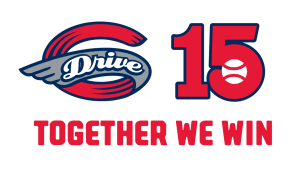 What’s made this such a special place to live is you. The unwavering support of Drive fans to our team and to our community is nothing short of miraculous. You’ve allowed the Drive to become ingrained in the life of the Upstate, you’ve made us Greenville’s front porch, and that’s especially important to us during this difficult time. Your continued support of the Drive is now more important than ever as we maneuver through this unprecedented summer and fall. The Drive will have a 15th season anniversary celebration; it’s just going to happen in 2021. We can’t wait to welcome you, your businesses, your families, your loved ones, and everyone in the community back to Fluor Field as soon as it’s appropriate to do so.
What’s made this such a special place to live is you. The unwavering support of Drive fans to our team and to our community is nothing short of miraculous. You’ve allowed the Drive to become ingrained in the life of the Upstate, you’ve made us Greenville’s front porch, and that’s especially important to us during this difficult time. Your continued support of the Drive is now more important than ever as we maneuver through this unprecedented summer and fall. The Drive will have a 15th season anniversary celebration; it’s just going to happen in 2021. We can’t wait to welcome you, your businesses, your families, your loved ones, and everyone in the community back to Fluor Field as soon as it’s appropriate to do so.
In the meantime, stay safe and healthy. We hope you’ll keep West End Events in mind for your corporate or personal event. After all, Fluor Field is our community’s ideal social distancing venue, and there’s still nothing like being at the ball park, even if there’s no game.
We look forward to 2021 being a celebration, both of our 15 years here in Greenville, and of a return to some sort of normalcy. We appreciate you more than you’ll ever know. And we can’t wait to see you again at the ballpark for Drive baseball come next April.

Jul 14, 2020 | Staying on Top

Dean Hybl, Executive Director, Ten at the Top
Depending on the minute, I could probably argue equally that 2020 has flown by faster than normal or that 2020 seems like the year that will never end. Either way, there is no disputing that 2020 is a year like none other and certainly one that they will be writing history books about for decades to come.
When the year began, historically low unemployment and a continuing strong growth in the Upstate’s economy provided great clarity about what issues were important to prioritize. At Ten at the Top, our primary focus areas at the beginning of the year included: Talent Attraction (most specifically around the K-12 teacher shortage), Mobility & Access to Transportation; Senior Needs, and Connecting Disconnected Communities to Resources for Starting & Growing a Business.
We were also looking forward to the 5th anniversary of the Pique Young Leaders Summit to be held in March and the 2020 Upstate Summit with best-selling author Richard Florida as the keynote speaker in September.
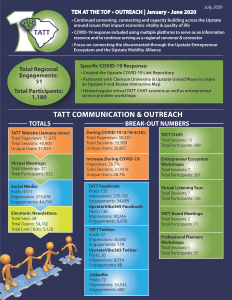
Click on the image to see an enlarged graphic.
As we all now clearly know, the best laid plans are no match for a global pandemic.
Beginning in early March, TATT joined most other businesses, local governments and non-profit organizations across the country in pivoting focus towards the growing global health crisis as well as the economic crisis that quickly developed as a result of the shutdown of non-essential in-person businesses.
As an organization that uses convening and connecting as a way to engage the community, Ten at the Top was able to very quickly redirect our primary focus to how we could help compile and share information needed by Upstate organizations and residents during this time of crisis.
On March 16th, TATT created the Upstate COVID-19 Community Link Repository that ultimately included links to more than 100 health, utility, education, business, government and many other resources across the Upstate.
An increased presence on social media as well as weekly e-newsletters with specific resources and insight from a variety of sector leaders from across the region provided additional opportunities for TATT to connect with Upstate residents and to share important community information.
Recognizing the need for a continued platform to keep stakeholders connected during a time of social distancing, TATT quickly began a series of virtual workshops for our Entrepreneur Ecosystem work group. We also began a TATT CHAT virtual workshop series that provided regular opportunities for stakeholders from across the region to connect with each other and hear updates on key issues impacting the region.
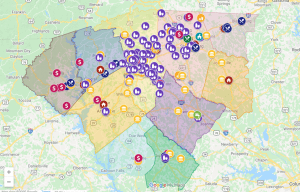 Building on previous efforts to build interactive regional asset maps, in partnership with Clemson University and Upstate United Ways, TATT developed an interactive regional food access map to help identify available food resources across the region for people dealing with food insecurity.
Building on previous efforts to build interactive regional asset maps, in partnership with Clemson University and Upstate United Ways, TATT developed an interactive regional food access map to help identify available food resources across the region for people dealing with food insecurity.
As a result of these efforts, Ten at the Top has reached a broader audience across the Upstate throughout the first half of 2020.
TATT’s social media reach (through Facebook, LinkedIn & Twitter) eclipsed 375,000 impressions and 44,000 direct engagements. The TATT Website saw a 31.91% increase in sessions during the COVID-19 crisis with nearly 49,000 sessions and over 71,000 pageviews so far in 2020. In addition, TATT electronic newsletters resulted in nearly 35,000 views and more than 5,000 clicks.
Moving TATT’s convening platform from in-person to virtual proved to be a positive opportunity to engage a wide range of participants from across the region. TATT hosted 27 virtual meetings with 832 total participants. In addition to the TATT CHAT and Entrepreneur Workshops, TATT also hosted an Upstate Virtual Listening Tour where stakeholders from the seven non-urban counties in the Upstate provided insight into their focus and concerns as we move forward in the health and economic crisis. The result of those sessions was a summary report and several next steps.
Though much of the focus of TATT staff during the second quarter of 2020 was on outreach, there was also continued work done to advance the focus areas identified at the beginning of the year.
The Upstate Mobility Alliance was officially launched in January and Michael Hildebrand was hired as the director. The Alliance is convening four workgroups around various elements of mobility (Moving People/Public Transportation, Growing Mobility Investments, Active & Livable Communities, and Technology & Innovation). The Alliance is also supporting local efforts to advance transportation & mobility across both the urban and rural areas within the region.
 The Education Spectrum initiative looking at the K-12 teacher shortage announced the Teach at the Top campaign in late 2019 and began a social media presence in 2020. In addition, work is currently underway on a Teacher Gateway platform to provide connections to all the information needed by someone interested in becoming a teacher in the Upstate.
The Education Spectrum initiative looking at the K-12 teacher shortage announced the Teach at the Top campaign in late 2019 and began a social media presence in 2020. In addition, work is currently underway on a Teacher Gateway platform to provide connections to all the information needed by someone interested in becoming a teacher in the Upstate.
The global pandemic and economic crisis illustrated the need for an Entrepreneur Ecosystem that connects service providers with opportunities to grow the awareness of programs available to support entrepreneurs and small business owners. In addition to hosting seven virtual workshops, the Upstate Entrepreneur Ecosystem also has continued to identify opportunities to connect the disconnected with needed entrepreneur resources. In the second half of 2020, the focus on building awareness and understanding of resources will continue through multiple platforms.
Another issue that has become a top focus in recent weeks is community safety following a number of deaths across the country at the hands of police officers and subsequent national protests around the Black Lives Matter movement.
Under the leadership of Terence Roberts, the Mayor of the City of Anderson and 2020-2021 Chairman of Ten at the Top, in July TATT will begin convening a discovery committee to look at opportunities to increase the safety of all residents across the Upstate while supporting community unity. Please be on the lookout for more information and a set of recommendations during the second half of 2020.
Unfortunately, the global pandemic has impacted TATT’s ability to host some of our signature events in 2020. The annual Pique Young Professionals Summit has twice been postponed and we are currently looking at alternatives to an in-person event for 2020. The bi-annual Upstate Regional Summit has been postponed until May 5, 2021, though we are pleased that Richard Florida will still be available to serve as the keynote speaker. The status of other TATT networking events and the annual Celebrating Successes event are currently in limbo with decisions to be made over the next several months.
Though the first half of 2020 has provided all of us with a new set of personal and professional challenges that were unforeseen when the year began, there are many great examples from across our region of individuals, organizations and communities working collaboratively to overcome these challenges. By continuing to think creatively and work collaboratively, the Upstate will address the challenges ahead and ultimately emerge from this crisis with greater resolve and community strength to tackle future tests and ensure this region remains a special place to live, learn, do business and raise a family for generations to come.


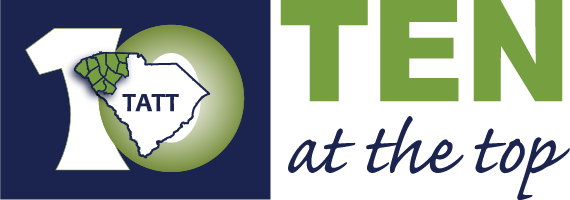


 Question: You guys are missed. How are your players? Is your player roster intact?
Question: You guys are missed. How are your players? Is your player roster intact? Poll: What’s Your Mask Style?
Poll: What’s Your Mask Style?


 What’s made this such a special place to live is you. The unwavering support of Drive fans to our team and to our community is nothing short of miraculous. You’ve allowed the Drive to become ingrained in the life of the Upstate, you’ve made us Greenville’s front porch, and that’s especially important to us during this difficult time. Your continued support of the Drive is now more important than ever as we maneuver through this unprecedented summer and fall. The Drive will have a 15th season anniversary celebration; it’s just going to happen in 2021. We can’t wait to welcome you, your businesses, your families, your loved ones, and everyone in the community back to Fluor Field as soon as it’s appropriate to do so.
What’s made this such a special place to live is you. The unwavering support of Drive fans to our team and to our community is nothing short of miraculous. You’ve allowed the Drive to become ingrained in the life of the Upstate, you’ve made us Greenville’s front porch, and that’s especially important to us during this difficult time. Your continued support of the Drive is now more important than ever as we maneuver through this unprecedented summer and fall. The Drive will have a 15th season anniversary celebration; it’s just going to happen in 2021. We can’t wait to welcome you, your businesses, your families, your loved ones, and everyone in the community back to Fluor Field as soon as it’s appropriate to do so.


 Building on previous efforts to build interactive regional asset maps, in partnership with Clemson University and Upstate United Ways, TATT developed an
Building on previous efforts to build interactive regional asset maps, in partnership with Clemson University and Upstate United Ways, TATT developed an  The Education Spectrum initiative looking at the K-12 teacher shortage announced the Teach at the Top campaign in late 2019 and began a social media presence in 2020. In addition, work is currently underway on a Teacher Gateway platform to provide connections to all the information needed by someone interested in becoming a teacher in the Upstate.
The Education Spectrum initiative looking at the K-12 teacher shortage announced the Teach at the Top campaign in late 2019 and began a social media presence in 2020. In addition, work is currently underway on a Teacher Gateway platform to provide connections to all the information needed by someone interested in becoming a teacher in the Upstate.